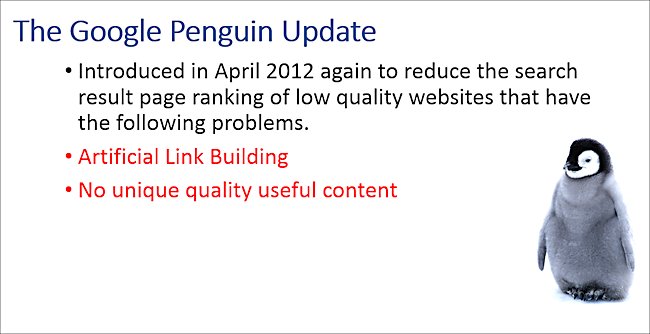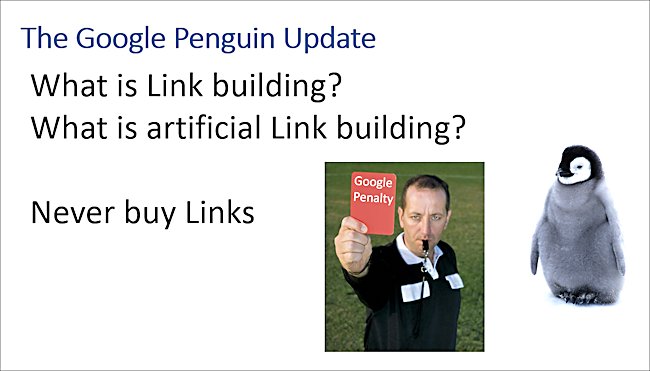What is the Google Penguin update?
Before Google introduced the Penguin update to its search engine algorithm in April 2012 poor quality websites were able to "game" the system and get a high position in the Google search result page for different keywords. Many of these websites had content on them that was not connected with the information the visitor wanted to read about. Google's software engineers found a way to reduce the search result page ranking of low quality websites that used artificial link building tactics and had no unique quality useful content. It worked. The Penguin update caused very big problems for established companies who had employed these cheating methods. Their websites disappeared from the search engine result pages or were moved so low down in the listings that no one found their page. Many companies who sourced a large part of their income from visitors to their internet pages were hurt financially.

The penguin update targeted website who reworded articles from other websites and posted this altered content onto their pages. This was a way companies had tried to avoid the downgrading of sites with duplicate content after the Panda Update. The Google algorithm is clever enough to spot websites that try this tactic. Google wants you to write new blogs, news reports and articles. Your site will be downgraded in the search engine results page listings if you copy and alter the structure of other peoples work. Be creative. Write interesting useful unique text rich pages that your visitors will want to read and share with their friends. Yes it is hard work but this is what you have to do to succeed.

One of the ways you can get a higher position in the Google search engine result pages is to obtain good relevant links to your website's pages. The idea was that Google would be able to understand what websites were better than their competitors by observing other users behavior. If visitors liked a website many would recommend them to to their friends and customers by talking about it in blog posts or by putting a link on their own website. Google was using links as a referral indicator system. The belief was that the more links a website had, the better the content was, compared with others in the same field. Many companies abused this system. Over the previous ten years before the introduction of the Penguin update thousands of artificial link building companies were formed.
These link building companies, for a fee, would employee people in India, Africa and Asia to construct thousands of bogus websites and add a link to your site on all of them. This would give you an unnaturally high link profile. Google's clever computer software could spot these patterns. As it is now against Google's Webmaster guidelines to pay for links, company websites that are found to have breached these rules are issued with a penalty and deleted from the Google results page until they have dealt with the problem. Offending website owners have to phone these people up and ask for the links to be removed or use Google's disavow tool. This process can take months. Could your company survive without a website?
Interflora is a large global company that sell flowers. In January 2013 the company paid newspapers to write articles about Valentines Day that contained links to Interflora's website. Google found out, gave them a penalty and kicked all their pages off the Google search engine result pages. Other big companies like BMW GoCompare have been give penalties as well as a lot of local and some national newspapers.